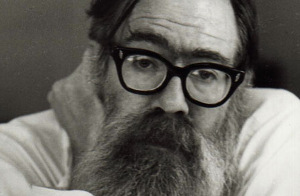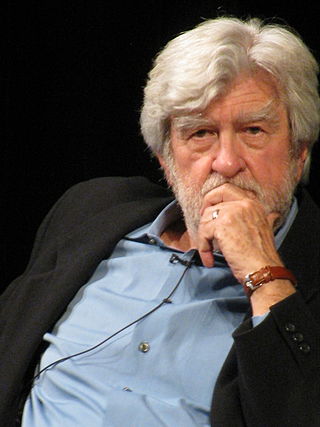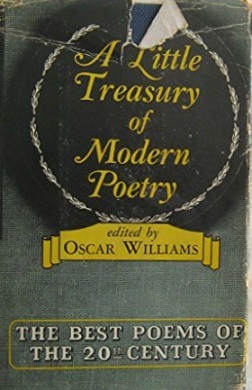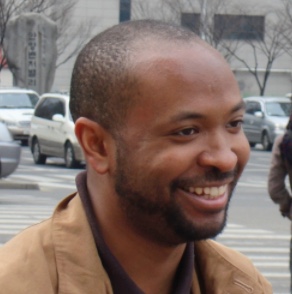Related Research Articles

Gerard Manley Hopkins was an English poet and Jesuit priest, whose posthumous fame places him among the leading English poets. His prosody – notably his concept of sprung rhythm – established him as an innovator, as did his praise of God through vivid use of imagery and nature.

Harold Hart Crane was an American poet. Inspired by the Romantics and his fellow Modernists, Crane wrote highly stylized poetry, often noted for its complexity. His collection White Buildings (1926), featuring "Chaplinesque", "At Melville's Tomb", "Repose of Rivers" and "Voyages", helped to cement his place in the avant-garde literary scene of the time. The long poem The Bridge (1930) is an epic inspired by the Brooklyn Bridge.
Paterson is an epic poem by American poet William Carlos Williams published, in five volumes, from 1946 to 1958. The origin of the poem was an eighty-five line long poem written in 1926, after Williams had read and been influenced by James Joyce's novel Ulysses. As he continued writing lyric poetry, Williams spent increasing amounts of time on Paterson, honing his approach to it both in terms of style and structure. While The Cantos of Ezra Pound and The Bridge by Hart Crane could be considered partial models, Williams was intent on a documentary method that differed from both these works, one that would mirror "the resemblance between the mind of modern man and the city."
The Faber Book of Modern Verse was a poetry anthology, edited in its first edition by Michael Roberts, and published in 1936 by Faber and Faber. There was a second edition (1951) edited by Anne Ridler, and a third edition (1965) edited by Donald Hall. The selection was of poems in English printed after 1910, which meant that work by Gerard Manley Hopkins could be included. A later edition was edited by Peter Porter.

Martín Espada is a Puerto Rican-American poet, and a professor at the University of Massachusetts Amherst, where he teaches poetry. Puerto Rico has frequently been featured as a theme in his poems.

John Allyn McAlpin Berryman was an American poet and scholar. He was a major figure in American poetry in the second half of the 20th century and is considered a key figure in the "confessional" school of poetry. His 77 Dream Songs (1964) won the 1965 Pulitzer Prize for Poetry.
The curtal sonnet is a form invented by Gerard Manley Hopkins, and used in three of his poems.

Stanley Plumly was an American poet and the director of University of Maryland, College Park's creative writing program.
B.H. Fairchild is an American poet and former college professor. His most recent book is An Ordinary Life, and his poems have appeared in literary journals and magazines including The New Yorker, The Paris Review, The Southern Review, Poetry, TriQuarterly, The Hudson Review, Salmagundi, The Sewanee Review. His third poetry collection, The Art of the Lathe, winner of the 1997 Beatrice Hawley Award, brought Fairchild's work to national prominence, garnering him a large number of awards and fellowships including the William Carlos Williams Award, Kingsley Tufts Poetry Award, California Book Award, Natalie Ornish Poetry Award, PEN Center USA West Poetry Award, National Book Award (finalist), Capricorn Poetry Award, and Rockefeller and Guggenheim fellowships. The book ultimately gave him international prominence, as The Waywiser Press in England published the U.K. edition of the book. The Los Angeles Times wrote that "The Art of the Lathe by B.H. Fairchild has become a contemporary classic—a passionate example of the plain style, so finely crafted and perfectly pitched...workhorse narratives suffused with tenderness and elegiac music."
Nationality words link to articles with information on the nation's poetry or literature.
David Wojahn is a contemporary American poet who teaches poetry in the Department of English at Virginia Commonwealth University, and in the low residency MFA in Writing program at the Vermont College of Fine Arts. He has been the director of Virginia Commonwealth University's Creative Writing Program.
The Bridge, first published in 1930 by the Black Sun Press, is Hart Crane's first, and only, attempt at a long poem.
"The Broken Tower" is the last poem meant to be published by poet Hart Crane in 1932. In keeping with the varieties and difficulties of Crane criticism, the poem has been interpreted widely—as death ode, life ode, process poem, visionary poem, poem on failed vision—but its biographical impetus out of Crane's first heterosexual affair is generally undisputed. Written early in the year, the poem was rejected by Poetry, and only appeared in print after Crane's famous suicide by water.

A Little Treasury of Modern Poetry: English and American is an anthology of poetry, edited by Oscar Williams, which was published by Scribner's, New York, in 1946, and Routledge and Kegan Paul, London, in 1947. Another edition, enlarged and rearranged, was published in 1952.
Marguerite Frances Cowley, known as Peggy Cowley and also as Peggy Baird and by her first married name Peggy Johns, was an American landscape painter. She was married to poet-playwright Orrick Johns and writer Malcolm Cowley and was the lover of playwright Eugene O'Neill and poet Hart Crane.

Michael Robert Collier is an American poet, teacher, creative writing program administrator and editor. He has published five books of original poetry, a translation of Euripides' Medea, a book of prose pieces about poetry, and has edited three anthologies of poetry. From 2001 to 2004 he was the Poet Laureate of Maryland. As of 2011, he is the director of the Bread Loaf Writers' Conference, a professor of creative writing at the University of Maryland, College Park and the poetry editorial consultant for Houghton Mifflin.

The Dream Songs is a compilation of two books of poetry, 77 Dream Songs (1964) and His Toy, His Dream, His Rest (1968), by the American poet John Berryman. According to Berryman's "Note" to The Dream Songs, "This volume combines 77 Dream Songs and His Toy, His Dream, His Rest, comprising Books I through VII of a poem whose working title, since 1955, has been The Dream Songs." In total, the work consists of 385 individual poems.
Robert Pack was an American poet and critic, and Distinguished Senior Professor in the Davidson Honors College at the University of Montana - Missoula. For thirty-four years he taught at Middlebury College and from 1973 to 1995 served as director of the Bread Loaf Writers' Conference. He is the author of twenty-two books of poetry and criticism. Pack has been called, by Harold Bloom, an heir to Robert Frost and Edwin Arlington Robinson, and has himself published a volume of admiring essays on Frost's poetry. He has co-edited several books with Jay Parini, including Writers on Writing: A Breadloaf Anthology.

Gary Jackson is an American educator and poet. He had received a Cave Canem and Bread Loaf fellowship and was awarded the Cave Canem Poetry Prize in 2009.
Desmond Egan is an Irish poet. He has published 24 Collections of poetry and published translations of Sophocles' Philoctetes and Euripides' Medea. His own work has been translated into Albanian, Bulgarian, Croatian, Czech, Dutch, French, German, Greek, Hungarian, Italian, Japanese, Polish, Swedish, Chinese, Spanish, Slovenian and Russian. He founded The Goldsmith Press (1972), edited the quarterly magazine for the arts Era (1974-1984), and starting in 1987 he has served as artistic director of the Gerard Manley Hopkins International Festival each July in Kildare, Ireland.